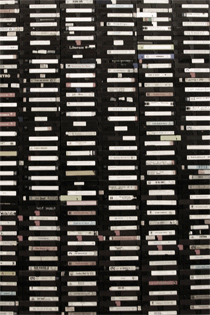Émotions des usagers et usagères de drogue.
Roxane Scavo et Mélina Germes | 14.09.2021
The aim of this paper is to show how marginalized drug users who frequent low threshold drug facilities inhabit urban spaces in two cities, Bordeaux and Berlin. With a social geography approach informed with sociology of emotions and critical cartography methods, we led emotional mapping interviews and produced cartographic collages from the results. We present the inhabiting topography of each city, the constant production and movement of makeshift homes, as well as the relationships with others from the perspective [...]
Ailleurs ? C’est ici.
Jacques Lévy, Olivier Lazzarotti et Xavier Bernier | 01.09.2021
Staycation is a concept that aims to define new vacation practices from home. This work questions them in the context of a form of reinvention of tourism in connection with the Covid-19 crisis. How to consider in the space of societies what it is suggested to call tourheresm (tour-here-sm) and tourherecists (tour-here-sts)? [...]
Manola Antonioli, Guillaume Drevon, Luc Gwiazdzinski, Vincent Kaufmann et Luca Pattaroni. 2021. Manifeste pour une politique des rythmes. Lausanne : EPFL Press.
Alain Guez | 02.08.2021
Rhythm is certainly one of the concrete shapes of time. The Manifesto for a Politics of Rhythm develops a convincing argument on the power of the rhythmic approach to confront the pathologies of capitalism and, more broadly, to build an emancipatory choreopolitics. In an attempt to extend the reflection, the "wager of rhythm" is discussed here on the basis of one of the Manifesto's hypotheses: rhythm is a notion that allows for the articulation of space and time. Ethnographies [...]
L’exemple de Didier Éribon.
Stanislas Deprez | 26.07.2021
Didier Eribon’s autobiography is a magnificent example of socio-analysis. The present article details the main points: the journey of the defector, the opposition of social classes, feelings of shame, the stakes of school, the place of homosexuality, the role of the intellectual. It also points out a contradiction in the approach: Eribon intends to remain within the framework of a critical sociology, relating the trajectories of the agents to social determinations, but he breaks with this explanation when he [...]
Les apports d’une approche par le rythme pour penser les dynamiques mémorielles dans la ville contemporaine.
Lucia Bordone | 20.07.2021
This article aims to highlight some specific contributions of the notion of rhythm to apprehend dynamics on memory within an urban environment. In particular, it points out how rhythm constitutes an effective operator for thinking about the capacity of certain urban forms to favor or hinder the experience of “being present together” (Boullier, 2010) and, consequently, the possibility of remembering together. Starting from the description of a moment of blocking that occurred during an empirical investigation, the article shows [...]
Les nouveaux intouchables.
Yveline Piarroux | 01.07.2021
The Covid pandemic has changed the way we handle social interactions. Senses that used to be engaged such as sight (masks), and touch (social distancing) can no longer be used in the same way. But the need for sociability has led to invent or use other means to interact. [...]
Projet politique et utopie ?
Philippe Rozin | 30.06.2021
Political ecology has gained considerable ideological and intellectual ascendancy in contemporary Western democracies. Having brought about a devastating, and perhaps irreparable, destruction of the earth's ecosystems, leaving the most terrible ecological footprint in the history of the world, humanity is left to ask a real question of a metapolitical nature to state governments. It is the whole relationship of life to republican and democratic political models that is being asked. The possibility of a political model of rupture, changing [...]
Illustration avec la pandémie de la Covid-19.
Michel Carrard | 16.06.2021
Originating from the work of classical economists during the first industrial revolution, the concept of the invisible hand of the market as a utopia of spontaneous self-regulation of our societies seems to be revived with the concept of the smart city. Emanating from multinational firms, the smart city embodies this self-regulating utopia through digital technologies. In this article, we consider that the invisible hand constitutes an ideal type in the sense of Max Weber, allowing us to make comparisons [...]
Christian Bouquet | 04.06.2021
John May and Jean-Pierre Guengant have been producing and exploiting the demographics of sub-Saharan Africa for more than 20 years. In this book, they synthesize the results of their investigations and research in the most neutral and objective way, without alarmism or denial. [...]
Prénoms propres, nom commun.
Xavier Bernier, Olivier Lazzarotti et Jacques Lévy | 01.06.2021
Based on three people who have nothing in common but sharing the same surname, the text describes their possible links and formulates interpretative conclusions which put them into perspective. Beyond that, however, the main question of this ‘workroom-of potential-science’ experiment is whether it is possible to draw scientific conclusions from a corpus chosen on non-scientific criteria. [...]


